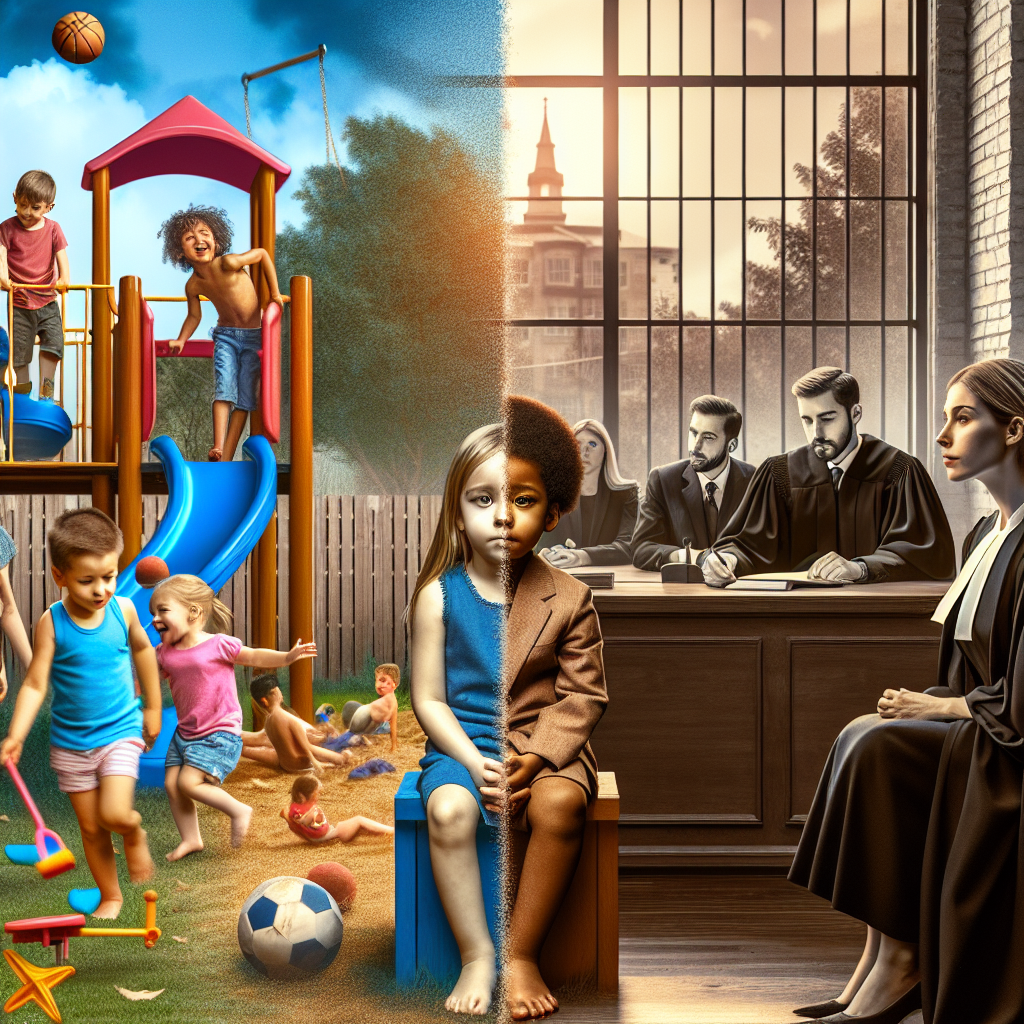
Introduction
Every child possesses a unique perspective shaped by their experiences, imagination, and understanding of the world around them. This perspective, which blossoms on playgrounds filled with laughter and adventure, can sometimes transition to the somber reality of courtrooms, where they stand as witnesses to crucial events. "From Playgrounds to Courtrooms: The Journey of a Child Witness" encapsulates this extraordinary transformation. This journey is not merely a passage from innocence to high-stakes legal environments but also a crucial aspect of the justice system that requires attention, care, and profound understanding.
Understanding the journey of child witnesses is essential for multiple reasons. Firstly, it sheds light on the complexities of child psychology and the legal mechanisms in place to protect and support these young individuals. Secondly, it highlights the importance of safeguarding the rights of children in a system that can often feel foreign and intimidating. This article will explore the multifaceted experiences of child witnesses, the challenges they face, and the support systems available for them.
The Role of a Child Witness
What Makes a Child’s Testimony Unique?
Children often perceive the world differently than adults, making their testimonies distinct, awe-inspiring, and sometimes surprisingly insightful. Their ability to provide fresh perspectives can be pivotal in legal contexts. However, this characteristic also necessitates sensitivity during questioning and examinations. Child witnesses may lack the emotional maturity and refinement needed to articulate their thoughts clearly, which can lead to misinterpretations and mistaken conclusions.
Case Study: The Impact of Child Testimonies in Court
One notable case that illustrates the significance of child witnesses occurred in the murder trial of 10-year-old Amanda in the early 2000s. Amanda observed a crime from her bedroom window. Her testimony proved crucial in convicting the accused. Law enforcement and legal professionals worked together to tailor their questioning to be age-appropriate, making Amanda feel safe and understood. This case underlines how proper handling of child witnesses can lead to just outcomes.
Preparing for Court: The Psychological Landscape
The Emotional Impact
Transitioning from the carefree environment of playgrounds to the seriousness of courtrooms can be overwhelming for a child. Many children experience anxiety, fear, and confusion as they grapple with the implications of their testimony. This emotional burden can affect not only their performance in court but also their overall mental well-being.
Case Study: Psychological Preparation In Action
In another compelling case involving a child witness, a 9-year-old named Tyler was called to testify in a domestic abuse trial. The child advocate responsible for preparing him employed various methods to familiarize Tyler with what he would face in court. Integrating play therapy techniques, the advocate helped Tyler express his fears and expectations vocally and through artistic expressions. Ultimately, this emotional support facilitated a more comfortable courtroom experience, demonstrating how preparation can ease the transition from playground to courtroom.
Table 1: Emotional Impact Statistics on Child Witnesses
| Emotion | Percentage of Children Reporting Feelings |
|---|---|
| Anxiety | 65% |
| Confusion | 58% |
| Fear | 75% |
| Relief | 40% |
Legal Protections in Place
Safeguarding the Rights of Child Witnesses
To ensure that children feel secure and protected while giving testimony, various legal statutes and guidelines have been established. Laws like the Child Victims’ Act and guidelines set forth by the National Center for Prosecution of Child Abuse underscore the importance of a child-sensitive approach in legal proceedings.
Innovations in Legal Processes
Technological innovations, such as video testimony and the use of child advocacy centers, demonstrate the judicial system’s efforts to create a more supportive environment for young witnesses. These methods allow child witnesses to contribute to cases without exposing them to the frightening courtroom atmosphere.
Challenges Faced by Child Witnesses
Balancing Truth with Emotion
One of the primary challenges child witnesses face is delivering truthful, accurate testimony while navigating their emotions. Many children do not fully comprehend the weight of their words or how the judicial process works. For example, in the case of young Sarah, who witnessed a robbery, her initial statements were influenced by confusion and fear, rendering her testimony less than impactful.
Case Study: Overcoming Challenges
In Sarah’s situation, a seasoned child psychologist was brought on board to assess and guide her prior to her court appearance. Through supportive and engaging activities, Sarah was able to regain clarity on her experiences, transforming her emotional turmoil into a coherent testimony that played a pivotal role in the case resolution.
Advocacy for Child Witnesses
Importance of Child Advocacy Organizations
Organizations dedicated to child advocacy are vital in bridging the gap between the courtroom and the emotional needs of child witnesses. These organizations provide critical support, such as counseling, legal guidance, and educational resources for children and their families during the judicial process.
Case Study: A Successful Advocacy Approach
The case of the nonprofit organization, Child Advocacy Centers (CAC), illustrates how effective advocacy makes a difference in the judicial process for children. Through their holistic approach to supporting child witnesses, CACs create nurturing environments where children can report crimes while receiving the emotional and psychological support they need.
Table 2: Services Offered by Child Advocacy Organizations
| Service | Description |
|---|---|
| Legal Support | Guidance during the judicial process |
| Counseling | Emotional support before and after testimony |
| Educational Workshops | Information about the court processes |
| Advocacy | Representation and protection in legal matters |
The Future of Child Witnesses
Trends in Support
As society becomes more aware of the unique challenges faced by child witnesses, many legal systems are adapting their practices. Training for legal professionals on how to engage with children effectively is gaining momentum, leading to successful collaborations that prioritize the child’s emotional and psychological well-being.
Innovations on the Horizon
With advancements in technology, the future may see even more innovative solutions designed to protect child witnesses. Virtual reality could reshape witness training, allowing children to experience mock court settings in safe, controlled environments, helping alleviate anxiety and improve their confidence before taking the stand.
Conclusion
"From Playgrounds to Courtrooms: The Journey of a Child Witness" encompasses both the bright and profoundly serious aspects of being a child in the legal system. It is essential to understand that this journey is not merely about speaking the truth before a judge but also involves significant psychological and emotional dimensions. By fostering supportive environments, employing innovative approaches, and advocating for the unique needs of child witnesses, we can markedly enhance their experiences within the judicial system.
Ultimately, empowering young witnesses is vital to achieving justice that respects their voice while valuing their emotional and mental well-being. By prioritizing these aspects, we help ensure future generations can navigate their personal journeys with resilience and courage.
FAQs
1. What is the role of a child witness in legal proceedings?
A child witness can provide essential information and perspectives regarding events they have witnessed, which can significantly influence the outcome of a case.
2. What support systems are available for child witnesses?
Child advocacy organizations, legal support systems, psychological counseling, and specialized training for legal professionals are all integral parts of the support network for child witnesses.
3. How can the judicial system protect child witnesses?
The judicial system can implement measures such as video testimonies, child advocacy centers, and legal statutes specifically aimed at ensuring the protection and well-being of child witnesses.
4. What are the emotional challenges faced by child witnesses?
Emotional challenges include anxiety, fear, and confusion, which can impact a child’s ability to provide reliable testimony. Proper preparation and support can help mitigate these emotions.
5. How can technology assist child witnesses?
Technology can provide innovative ways to prepare children for court, such as virtual mock courtrooms or video testimonies that allow them to avoid intimidating courtroom settings.
The journey of a child witness—from playgrounds to courtrooms—is fraught with complexity, challenges, and incredible potential. By fostering understanding and implementing effective support systems, we can help ensure that their voices contribute to a brighter, more equitable future.















